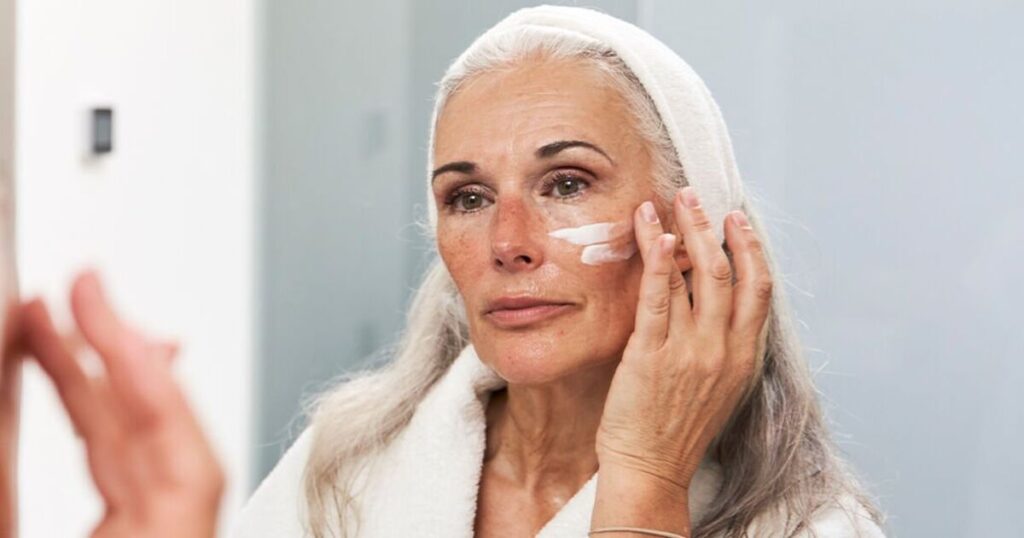

Experts recommend opting for skincare products with either vitamin C or retinol (Image: Getty Images)
As we get older, it’s natural to see lines and wrinkles begin to form. Still, these aesthetic changes can be reduced, or somewhat held off, with the right skincare. In fact, there are two key ingredients that experts say you should look out for.
Speaking to Express.co.uk, head of Este Medical Group and skin expert Sam Cinkir explains that you can cut down your skincare routine by reaching for products containing two key ingredients: Vitamin C and retinol.
”These scientifically-backed ingredients aren’t just hype – they can give you brighter, firmer, and younger-looking skin without breaking the bank,” he says.
Similarly, Dr Thuva Amuthan, dermatology doctor and founder of Dr. Derme Skin Clinics, describes retinol and Vitamin C as the “most effective ingredients for anti-ageing”.
Whether you’re a skincare beginner, an experienced user, or are concerned about sensitivity, with the help of the experts, we have rounded up some of the top-recommended products on the market and explained how to easily incorporate them into your daily routine.
What is Vitamin C?
“Vitamin C is a potent antioxidant that neutralises free radicals caused by UV exposure and pollution,” says Sam. It’s best used in the morning, as it “protects and brightens” during the day.
This is why it’s a common ingredient often found in day creams, moisturisers and serums. Plus, it’s considered beneficial for most skin types.
Dr Thuva continued: “It evens out tone and supports collagen production, making skin look more youthful and radiant.”
However, some people may experience mild tingling or irritation when using Vitamin C. “If this happens, opt for a lower concentration or a buffered formula,” he added.
How to use it:
Given that it protects and enhances skin during the day, Vitamin C should be applied in the morning for the best results.
”After cleansing, apply a few drops of Vitamin C serum to your face and neck. Follow with a moisturiser and sunscreen. It’s best if this is SPF 30 or higher,” explained Sam.
As with any skincare product, you should always read the instructions before using a vitamin C serum to check what quantity to use and how often — this information is usually found in the description before you buy and on the product’s label.
Vitamin C products to buy
La Roche-Posay Pure Vitamin C10 Serum

This supercharged serum is currently reduced with 20% off (Image: Boots)
You’ve likely heard of La Roche-Posay, as the French skincare brand is often recommended by beauty and skincare experts. Those with sensitive skin may be understandably cautious when choosing skincare, but this lightweight serum is dermatologist-recommended. Plus, the formula is suitable for all skin types – including sensitive skin.
Sam’s advice for sensitive or dry skin is to ”opt for gentler formulations”, like this one. The serum also contains ascorbic acid, an ingredient that Dr Thuva recommends for sensitive skin.
Like all products containing vitamin C, it aims to improve radiance and even out skin tone while also helping to correct the appearance of fine lines and wrinkles. If you’re suffering from clogged pores, La Roche-Posay’s version contains salicylic acid, too, which should help by exfoliating the skin’s surface to prevent breakouts.
La Roche-Posay typically has a higher price tag, so it can feel like a bit of a splurge. The La Roche-Posay Vitamin C12 Serum costs £45, but there’s currently a buy one, get one half-price deal on La Roche-Posay products at Boots if you want to stock up.
Garnier 3.5% Vitamin C

The Garnier serum contains a low concentration of vitamin C for beginners (Image: Boots)
If you’re new to vitamin C, this low-concentration serum is a good place to start. It’s ideal for those who are on a budget and want to boost their skincare regime without breaking the bank, as the Garnier 3.5% Vitamin C serum costs £12.97 at Amazon right now. You can also find it on the shelves of your local health and beauty shops such as Boots and Superdrug.
For those using vitamin C for the first time, the 3.5% vitamin C shouldn’t be too harsh on the skin, so you can test how your skin reacts before using anything stronger. When trying out new products, skin can sometimes become irritated, so it’s great to see the Garnier product lists niacinamide in its ingredients. For those not in the know, niacinamide has soothing properties that work to help balance out any harsh effects of vitamin C.
And, as a bonus, the serum also contains lemon extract, which can help reduce the appearance of dark spots. The addition of a brightening superfood ingredient is especially helpful during the dull winter months.
The Ordinary Vitamin C Suspension 23% + HA Spheres 2%

This under £8 product is an affordable option (Image: The Ordinary)
Experienced skincare users can be slightly more experimental with their choices, especially those who have “normal” skin types.
For a high-strength option, you could try the Vitamin C Suspension cream from The Ordinary. Though The Ordinary has a diverse range of products that can initially sound daunting, it’s a highly accessible option – mainly thanks to the price. Our Shopping Editor, Aimee Robinson, is a big fan of the brand. “I always reach for The Ordinary, and it makes up the majority of items in my skincare collection,” she said. “While the products can sound a little scientific at first, once you know how to use them, they’re a really great and budget-friendly option.”
The Vitamin C moisturiser is no different. It contains 23% vitamin C and costs just £7.80 via The Ordinary website or at Boots.
Most of The Ordinary’s skincare range has a balanced combination of ingredients, and this product contains hyaluronic acid, a hydrating, anti-ageing ingredient that plumps up the skin and tackles dryness. Unlike other serum-based vitamin C skincare products, this has a thinner lotion consistency that is arguably easier to apply and absorb.
However, experts warn that beginners should avoid vitamin C products with a concentration higher than 20%, so this is one to build up for long-term results.
What is retinol?
Retinol is a derivative of Vitamin A, an essential vitamin for cell regeneration in the body. It pushes fresh cells to the surface of the skin.
Retinol can also help increase collagen production, and as such, it can work wonders for anti-ageing.
Dr Thuva explained: “Retinol is backed by extensive research for its ability to boost collagen, speed up skin cell turnover, and improve skin texture. It helps reduce fine lines, wrinkles, pigmentation, and acne over time.”
However, as retinol is a high-strength skincare ingredient, it can affect people’s skin differently.
“Common side effects can include dryness, peeling, and irritation, especially in the first few weeks,” says Dr Thuva. But don’t let this put you off! The key is finding the right consistency and routine for your skin. The expert recommends experimenting with how much of the product you use and how often you apply it.
He also added that pregnant or breast-feeding women should probably stay away from any retinol-based products, as well as those with highly sensitive or eczema-prone skin.
How to use it:
Retinol should not be used during the day as it makes the skin more sensitive to sunlight. This exposes the skin to harmful UV rays, negating the benefits of retinol. Instead, you should use it only as part of your nighttime routine.
Sam recommends applying “a pea-sized amount” two or three times a week. “Gradually increase frequency as your skin adjusts,” he said. You should always follow with a moisturiser to avoid dryness.
Retinol products
CeraVe Resurfacing Retinol Serum

This effective product contains a blend of anti-ageing ingredients (Image: Superdrug)
CeraVe’s answer to retinol is perfect for beginners, as it’s suitable for sensitive skin. Those with blemish-prone skin can also benefit, as the serum is formulated to fade the appearance of discolouration and dark marks.
Some people start to notice a little dryness after using retinol, so it’s important to keep hydration levels topped up. That’s why CeraVe has included niacinamide in its ingredients list for a moisturising finish.
Sam recommends that those with sensitive skin opt for a “slow-release retinol to minimise irritation,” much like the CeraVe option.
He also says you should ”layer a hydrating serum or ceramide-rich moisturiser on top to strengthen the skin barrier”. If you want to stick with CeraVe for this, you could use the CeraVe PM Facial Moisturising Lotion, which contains hyaluronic acid and ceramides to moisturise the skin deeply.
The Cerave Resurfacing Retinol Serum is currently discounted at Superdrug, reduced from £22.99 to £18.38.
For beginners – The Ordinary Granactive Retinoid 2% Emulsion

The Ordinary’s retinol is an affordable way to try the ingredient (Image: Boots)
The Ordinary Granactive Retinoid Emulsion is a great option for those easing retinol into their skincare routine. If retinol isn’t used cautiously, it can cause short-term irritation, especially if the skin’s tolerance isn’t gradually built up, so the low percentage makes this a great option to try slowly over time.
It’s also a great option for more mature skin types, as it can combat visible signs of ageing and improve the appearance of fine lines formed by loss of collagen. The Ordinary claims it can also help even out skin texture and tone – something we can all benefit from.
The Ordinary Granactive Retinoid 2% Emulsion is £11 at Lookfantastic right now.
For experienced skincare users – Medik8 Crystal Retinal 6 Serum

Medik8 Crystal Retinal 6 Serum is a cult favourite among skincare fans (Image: Lookfantastic)
Medik8‘s high-performance skincare is popular with premium beauty fans, and the Crystal Retinal range is the brand’s most famous. There are six different strengths of the product, and if you’re a regular vitamin A user, you might want to reach straight for the Medik8 Crystal Retinal 6 Serum. But if you’re a beginner, you’d be better off staring low and working your way up.
It contains a patented blend of retinaldehyde and Medik8 says it can work up to 11 times faster than standard retinol.
If you want to improve your skin’s texture, brightness, firmness, and clarity, this product claims to offer all four benefits. As with all skincare, take a realistic approach and don’t expect results overnight, but an independent clinical study that tested Crystal Retinal 6 on 33 participants over 12 weeks showed wrinkle reduction with one tube. Sally Newall, Express.co.uk’s Head of Affiliates has been using the Crystal 6 for six weeks and while she hasn’t seen wrinkle reduction so far, the product has improved skin texture: “I found I was getting dry patches on my T-zone and foundation was flaking. This has already really improved that and evened things out.”
Medik8 Crystal Retinal 6 Serum costs £69 on Medik8’s website, but it’s also reduced to £58.95 on Amazon.
Can you use retinol every day?
Dermatologists mostly advise starting with gentler retinol products and testing out how your skin reacts before building up over time to see further results. Dr Thuva advises starting with a low concentration (anywhere from 0.25% to 0.3%) around two times a week. At first, it is better to apply a thin layer and then gradually increase frequency as the skin builds tolerance.
Sam added that you may need some patience when using retinol. “It can take eight to 12 weeks to see noticeable results, but the improvements are long-lasting,” he explained.
Why is it important to boost collagen as you get older?
The loss of collagen is a universal part of the ageing process and leaves the skin thinner and saggier looking and feeling.
Menopause can also increase changes to the skin and collagen production. A study by Oxford Academic found: ”Menopause has a clear impact on collagen synthesis, with a loss of nearly 30% in the first five years after menopause.”
But this is where Vitamin C can help. ”Collagen is the structural protein that keeps skin firm, smooth, and plump,” explained Sam.
“Unfortunately, from our mid-20s onwards, collagen production declines by about 1% each year. This loss accelerates during perimenopause and menopause due to a drop in oestrogen levels, leading to thinner, drier, and more fragile skin.
“Vitamin C plays a key role in collagen synthesis, helping to maintain skin firmness and even out skin tone. Retinol, by promoting cell turnover and stimulating fibroblast activity, helps the skin regenerate and produce new collagen.”




















